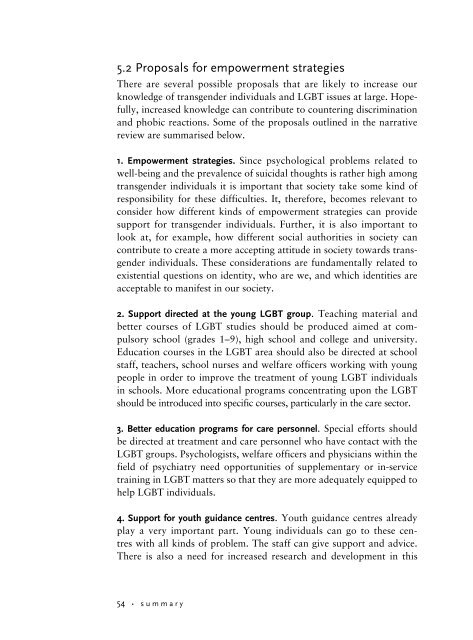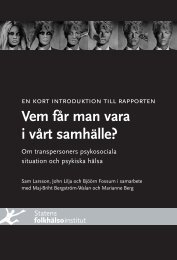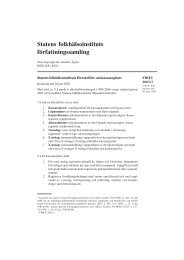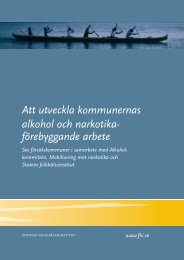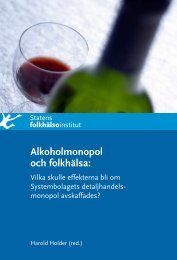- Page 1 and 2:
Vem får man vara i vårt samhälle
- Page 3 and 4: © Statens folkhälsoinstitut Öste
- Page 5 and 6: 1.3 Research questions ............
- Page 7 and 8: 4. Transvestism och transsexualism
- Page 9 and 10: 9.5 Olika typer av socialt avstånd
- Page 11 and 12: 16.1 Mångdimensionell analys - ind
- Page 13 and 14: socionomer och socialpedagoger. Giv
- Page 15 and 16: det egentligen omöjliggör forskni
- Page 17 and 18: Författarpresentationer Sam Larsso
- Page 19 and 20: dimensionell ansats (Hutchison 1999
- Page 21 and 22: senteras av kvinnliga rollframstäl
- Page 23 and 24: vestism visserligen rent allmänt a
- Page 25 and 26: 3. Några centrala empiriska studie
- Page 27 and 28: i olika studier (Docter 1988; Larss
- Page 29 and 30: olika paradigm. Inom kognitiv veten
- Page 31 and 32: 4.4 Transpersonsfenomenet i ett his
- Page 33 and 34: om att förstå dem utifrån empiri
- Page 35 and 36: 1. Empowermentinsatser. Eftersom de
- Page 37 and 38: lingen om transpersonsfenomen. För
- Page 39 and 40: understanding of the content of the
- Page 41 and 42: Cesaretti, 2001; Bullough & Bulloug
- Page 43 and 44: dressing. These authors mention tha
- Page 45 and 46: 3. Some empirical studies on transg
- Page 47 and 48: partners who found it difficult to
- Page 49 and 50: minds is often put forward (Ornstei
- Page 51 and 52: forcement and affirmation (identity
- Page 53: The processes of discrimination. Di
- Page 57: construction of social gender. We n
- Page 61 and 62: ild föregående sida: nana, transs
- Page 63 and 64: vestiter och transsexuella, egentli
- Page 65 and 66: samman bisexualitet och transperson
- Page 67 and 68: • Sexuellt objektval (den erotisk
- Page 69 and 70: forskningslitteraturen beskriver de
- Page 71 and 72: har flera jag, även om de använde
- Page 73 and 74: (Bullough & Bullough 1993; Docter 1
- Page 75 and 76: teori har också förändrat synen
- Page 77 and 78: Kulturell dominans beskriver Young
- Page 79 and 80: olika berättelser om vem ”jag”
- Page 81 and 82: 1.13 Vikten av ett aktörsperspekti
- Page 83 and 84: (se Butler 2004/2006; Rowan & Coope
- Page 85 and 86: 5. I den femte och avslutande delen
- Page 87 and 88: 2.3 Motiv till val av design och in
- Page 89 and 90: levd ohälsa och diskriminering. Vi
- Page 91 and 92: fokuserar på aktuella och specifik
- Page 93 and 94: 2.6 En gruppering av studiens fråg
- Page 95 and 96: sociala faktorer (Bullough & Bullou
- Page 97 and 98: De enskilda teman som diskuteras i
- Page 99 and 100: Översikten diskuterar dessa teman
- Page 101 and 102: 2.12 Verifikation och validitet i a
- Page 103 and 104: Backman (1998) beskriver några kva
- Page 105:
del 2. Olika perspektiv på transpe
- Page 108 and 109:
Kapitel 3. Transidentiteter och cro
- Page 110 and 111:
maner eller medicinmän ofta crossd
- Page 112 and 113:
isk religionsförkunnare, Ramakrish
- Page 114 and 115:
Docters beskrivning av crossdressin
- Page 116 and 117:
8. Att individen inte lever på hel
- Page 118 and 119:
följande beskrivningarna av de tv
- Page 120 and 121:
stam, 2003; Stryker & Whilttle, 200
- Page 122 and 123:
Peru och Brasilien. I dessa länder
- Page 124 and 125:
nämnas att Judith Butler har probl
- Page 126 and 127:
terapi eller könsbytesoperation. W
- Page 128 and 129:
ation (Bullough & Bullough, 1993; C
- Page 130 and 131:
sikten kopplas sedan vissa narrativ
- Page 132 and 133:
gränserna för vår roll, för vå
- Page 134 and 135:
Kapitel 4. Transvestism och transse
- Page 136 and 137:
Larsson, Bergström-Walan & Hall 19
- Page 138 and 139:
myself dressed up”. Fem procent t
- Page 140 and 141:
viktigaste rollerna och alla subide
- Page 142 and 143:
Brierley (1979) menar att transvest
- Page 144 and 145:
FPE-Norge genomförde en uppföljan
- Page 146 and 147:
Bullough et al. (1983) undersökte
- Page 148 and 149:
4. Mötet med en transsexuell vän.
- Page 150 and 151:
Stoller (1975) beskriver transsexua
- Page 152 and 153:
västerländska kulturer mot att ac
- Page 154 and 155:
En manlig transsexuell, George Jorg
- Page 156 and 157:
4.6 Sammanfattning Kapitlet diskute
- Page 158 and 159:
Kapitel 5. Det mångdimensionella m
- Page 160 and 161:
hänför sig till ett observerande
- Page 162 and 163:
ortom individens sinne. Sinnet best
- Page 164 and 165:
kännetecken såsom minnen, identif
- Page 166 and 167:
analytiskt - exempelvis minne, bed
- Page 168 and 169:
(von Franz 1978). Anima är alltså
- Page 170 and 171:
5.2.3 socialkonstruktionistiskt inf
- Page 172 and 173:
komplexa natur och ofta finns det e
- Page 174 and 175:
Antropologiska forskare och transpe
- Page 176 and 177:
jagteoretiska forskningen transcend
- Page 178 and 179:
ter), psykodynamisk teori (Thomas 1
- Page 180 and 181:
Transvestiter tenderar att vara mer
- Page 182 and 183:
A cognitive process interpretable a
- Page 184 and 185:
Stern (1987) skildrar betydelsen av
- Page 186 and 187:
Den intrapsykiska/psykodynamiska mo
- Page 188 and 189:
Sociologiska perspektiv Sociologisk
- Page 190 and 191:
detaljerad analys av samspelet mell
- Page 192 and 193:
eskriva hur olika faktorer samspela
- Page 194 and 195:
uppfattats av aktörerna eller tran
- Page 196 and 197:
upplevelse och jaguppfattning eller
- Page 198 and 199:
3. Utvecklingspsykologiskt eller in
- Page 201 and 202:
ild föregående sida: suzy, drag q
- Page 203 and 204:
• De grupper i ett samhälle som
- Page 205 and 206:
6.2 Viktiga idéhistoriska händels
- Page 207 and 208:
som en känslig och lättväckt fas
- Page 209 and 210:
6.3 Viktiga händelser från 1900 t
- Page 211 and 212:
havare. De hade intresse av samhäl
- Page 213 and 214:
sexuella par i juridisk mening - la
- Page 215 and 216:
Kapitel 7. Psykisk hälsa och ohäl
- Page 217 and 218:
av varandra, det finns ett samband.
- Page 219 and 220:
Det är en mycket stor mängd fakto
- Page 221 and 222:
heterna). Dessutom kan begreppet ps
- Page 223 and 224:
tionsförmågan. Av tradition har m
- Page 225 and 226:
7.6 Sociala skalor Det finns en mä
- Page 227 and 228:
upplever på arbetsplatsen. De som
- Page 229 and 230:
7.8 Livskvalitet och olika aspekter
- Page 231 and 232:
sätt som den enskilda individen ka
- Page 233 and 234:
ende, vilket kan ha samband med den
- Page 235 and 236:
Transsexuella som önskar genomgå
- Page 237 and 238:
I en utvärdering av ett kombinerat
- Page 239 and 240:
En grupp som kan tänkas ha speciel
- Page 241 and 242:
pernas svårigheter med att kunna f
- Page 243 and 244:
Vi diskuterar här komma ut-process
- Page 245 and 246:
En grupp forskare delar upp identit
- Page 247 and 248:
kan spela en viktig positiv roll i
- Page 249 and 250:
ilder (Garnets & Kimmel 1993). I vi
- Page 251 and 252:
3. Individen kan slippa att undvika
- Page 253 and 254:
(Håkansson 1987). Identitetsambiva
- Page 255 and 256:
är nödvändigt för att komma ut.
- Page 257 and 258:
land annat inneburit att föreninge
- Page 259 and 260:
utan i hög grad psykoterapi i olik
- Page 261 and 262:
Ofta diskuteras homofobiska reaktio
- Page 263 and 264:
tins förfall. Carlsson pekar på a
- Page 265 and 266:
sin könsidentitet. Av dessa hade 5
- Page 267 and 268:
inte. Det är förenklingar som bas
- Page 269 and 270:
som kan ge dem socialt stöd för d
- Page 271 and 272:
eller några medlemmar i gruppen vi
- Page 273 and 274:
kvinnliga lärare från manliga ele
- Page 275 and 276:
Diskriminering I den finländska st
- Page 277 and 278:
De som under längre tid gått ut
- Page 279:
specifikt undersökt förhålladena
- Page 283 and 284:
ild föregående sida: frenzy, tran
- Page 285 and 286:
- Det är alltså samma jagkänsla?
- Page 287 and 288:
- Ja, jag-är-känslan är mycket h
- Page 289 and 290:
ett annat manér eller ett annat ut
- Page 291 and 292:
- Ja, helt klart. Det är ett över
- Page 293 and 294:
- Om du skulle beskriva den känsla
- Page 295 and 296:
- Man skulle kunna invända här at
- Page 297 and 298:
Längre fram i intervjun beskriver
- Page 299 and 300:
- Vilka tankar och känslor fick ma
- Page 301 and 302:
Erik beskriver Eva, sitt kvinnliga
- Page 303 and 304:
eller övergripande jagnivå upplev
- Page 305 and 306:
… så ville jag försöka att se
- Page 307 and 308:
- Jag hade ju känslan inom mig att
- Page 309 and 310:
- Att jag då i unga år är på et
- Page 311 and 312:
tuerat att mitt rätta jag, det är
- Page 313 and 314:
- Tre år, när jag liksom … Ja,
- Page 315 and 316:
- Du försöker verkligen här hela
- Page 317 and 318:
Ann lever i dag, menar hon, ett lyc
- Page 319 and 320:
procent) hade upplevt sexuella lust
- Page 321 and 322:
och åtta personer (73 procent) sku
- Page 323 and 324:
10.5 Psykosocial situation och uppv
- Page 325 and 326:
al. 1983; Bullough & Bullough 1993)
- Page 327 and 328:
Manliga egenskaper: Kraftfull, domi
- Page 329 and 330:
även en beskrivning av vad de anse
- Page 331 and 332:
- Så mannens känsloliv blir mera
- Page 333 and 334:
världen och att försöka leva dig
- Page 335 and 336:
Mats menar att transvestism är ett
- Page 337 and 338:
Krister upplever att ”den kvinnli
- Page 339 and 340:
- Ja … det är så sexuellt betin
- Page 341 and 342:
och närmade mig väl egentligen in
- Page 343 and 344:
Karl Karl menar att han som person
- Page 345 and 346:
- Mmm! De tankarna kanske inte gjor
- Page 347 and 348:
11.7 Sammanfattning Kapitlet visar
- Page 349 and 350:
Äktenskap och samborelation och eg
- Page 351 and 352:
I sammanhanget kan nämnas en under
- Page 353 and 354:
tiva känslor. Resterande 35 procen
- Page 355 and 356:
Liknande resultatprofiler har beskr
- Page 357 and 358:
hustrurna hade fått vetskap om sin
- Page 359 and 360:
kare, det rinner av honom allt det
- Page 361 and 362:
Hustrurna i Larssons et als. (1995)
- Page 363 and 364:
och hur allvarligt de bedömde olik
- Page 365 and 366:
• Mer förstående vid klädinkö
- Page 367 and 368:
en del av dem”. De övriga kvinno
- Page 369 and 370:
före äktenskapet eller i ett tidi
- Page 371:
del 5. Analys av resultat- teman oc
- Page 374 and 375:
Inledning I del V (kapitel 14-17) s
- Page 376 and 377:
Kapitel 14. Analys av transpersoner
- Page 378 and 379:
turen) för att överhuvudtaget kun
- Page 380 and 381:
I forskningslitteraturen brukar man
- Page 382 and 383:
mittgrupp som hade en mer neutral i
- Page 384 and 385:
Det gäller särskilt hennes beskri
- Page 386 and 387:
Jag satsade allt på min konstverks
- Page 388 and 389:
för jag behövde hjälp, stöd och
- Page 390 and 391:
Ingrids berättelse i sin helhet ä
- Page 392 and 393:
Kapitel 15. Psykiska och psykosocia
- Page 394 and 395:
nalgrupper som kommer i kontakt med
- Page 396 and 397:
ett behov av att klä sig i motsatt
- Page 398 and 399:
Kapitel 16. Tolkningar av resultatb
- Page 400 and 401:
själva och hur de mår (se Lombard
- Page 402 and 403:
Liknande situation finns vid attity
- Page 404 and 405:
5. Ett socialpsykologiskt perspekti
- Page 406 and 407:
form av bemötande som transpersone
- Page 408 and 409:
den högre droganvändningen kan ko
- Page 410 and 411:
WHO beskriver psykisk hälsa som et
- Page 412 and 413:
Rosenberg (2006) framhåller i sitt
- Page 414 and 415:
Översiktstabell 16.2. Ett urval av
- Page 416 and 417:
16.10 Metoddiskussion Syftet med de
- Page 418 and 419:
(Bullough & Bullough 1993; Prince &
- Page 420 and 421:
I Sverige har Tiina Rosenberg (2002
- Page 422 and 423:
Transsexuella personer beskrivs dä
- Page 424 and 425:
17.2 Informations- och utbildningsp
- Page 426 and 427:
En ökad kunskap bland lärarna kan
- Page 428 and 429:
17.5 Utvärderings- och undersökni
- Page 430 and 431:
En annan organisation är Internati
- Page 432 and 433:
Det vore också önskvärt att fors
- Page 434 and 435:
Referenser Alsop, R., et al. (2002)
- Page 436 and 437:
Berg, M. (2008). Självets garderob
- Page 438 and 439:
Bullough, V.L. & Bullough, B. (1993
- Page 440 and 441:
Courtenay, W.H. (2000). Constructs
- Page 442 and 443:
Everitt, B.S. (1977). The analysis
- Page 444 and 445:
Gosselin, C. & Wilson, T. (1980). S
- Page 446 and 447:
Hofsten, A.-M. (1977). Leva med pil
- Page 448 and 449:
Kendall, L. (2006). Meaning and ide
- Page 450 and 451:
Larsson, S., Bergström-Walan, M.-B
- Page 452 and 453:
Lohman, H. (1973). Psykisk hälsa o
- Page 454 and 455:
Morrow, D.F. & Messenger, L. (2006,
- Page 456 and 457:
Piaget, J. (1976). Barnets själsli
- Page 458 and 459:
Rudd, P. (1988). My husband wears m
- Page 460 and 461:
Strauss, A. & Corbin, J. (1990). Ba
- Page 462 and 463:
Warner, J., et al. (2004). Rates an
- Page 464:
Young, I.M. (2000). Att kasta tjejk


